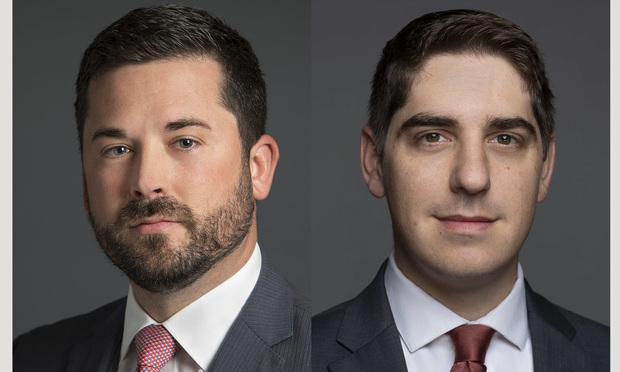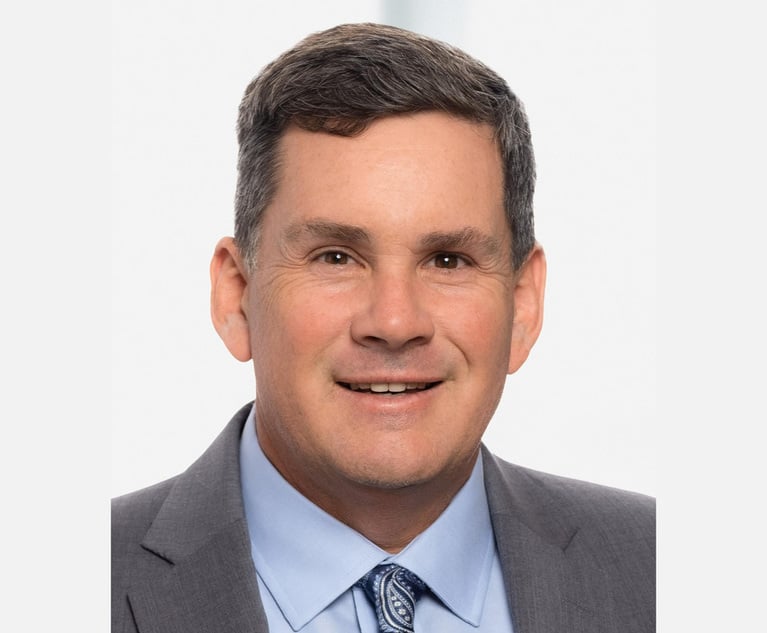Enforceability of Oral Change Orders Despite 'No Oral Modification' Clauses
Most construction contracts contain one or more NOM clauses, including a requirement that valid change orders be in writing. Generally, these clauses provide that a contract cannot be modified absent a writing executed by the parties.
July 02, 2020 at 12:37 PM
9 minute read
The original version of this story was published on The Legal Intelligencer
 James D. Miller and Benjamin R. Wright of Babst Calland Clements & Zomnir.
James D. Miller and Benjamin R. Wright of Babst Calland Clements & Zomnir.
The recent decision in STI Oilfield Services v. The Williams Companies f/k/a Access Midstream Partners, No. 2018-1003 C.P. (Pa. Com. Pl., Susquehanna County, March 16, 2020 Opinion), highlights the challenges those in the construction industry face when contractors or subcontractors seek additional compensation based upon an alleged oral change order or modification, even when the underlying contract contains a clear "no oral modification" (NOM) clause.
Most construction contracts contain one or more NOM clauses, including a requirement that valid change orders be in writing. Generally, these clauses provide that a contract cannot be modified absent a writing executed by the parties. This is intended to avoid having the carefully drafted written agreement of the parties set aside based on alleged oral conversations that are often supported only by memory or by piecing together evidence of conduct of the parties. Oral modifications naturally breed disagreements, misunderstandings and protracted litigation—everything a well-written contract seeks to avoid. However, Pennsylvania courts have not strictly enforced NOM clauses, especially with respect to construction contracts and alleged oral change orders for extra work.
In Universal Builders v. Moon Motor Lodge, 244 A.2d 10, 15 (Pa. 1968), the Pennsylvania Supreme Court held that, outside of a contract subject to the statute of frauds, a written "contract can be modified orally although it provides that it can be modified only in writing." "Construction contracts typically provide that the builder will not be paid for extra work unless it is done pursuant to a written change order, yet courts frequently hold that owners must pay for extra work done at their oral direction." "The effectiveness of a nonwritten modification in spite of a contract condition that the modifications must be written depends upon whether enforcement of the condition is or is not barred by equitable considerations, not upon the technicality of whether the condition was or was not expressly and separately waived before the non-written modification."
Courts have significant discretion in determining whether to allow oral modification claims to survive dispositive motions and move to trial. When exercising that discretion, courts look to multiple equitable factors including estoppel, the "waiver of the [NOM] or the existence of some sort of fraud, mistake, accident or reliance." See Delaware River Port Authority v. Thornburgh, 585 A.2d 1123, 1128 (Pa. Commw. Ct. 1989) (citing Universal Builders, 244 A.2d at 16). The evidentiary standard generally required for proving oral modification of a written agreement is "clear and convincing evidence," but the protection this higher standard offers to contracting parties who do not believe an oral modification occurred often arrives too late, at trial after incurring significant litigation costs.
In Somerset Community Hospital v. Allan B. Mitchell & Associates, 685 A.2d 141, 146 (Pa. Super. Ct. 1996), the Superior Court was presented with the issue of whether an architect who performed design work for a hospital was entitled to seek additional fees for its alleged increased scope of work based upon oral agreements with the hospital, even where the underlying contract contained an NOM clause. The court determined that "an agreement that prohibits nonwritten modification may be modified by subsequent oral agreement if the parties' conduct clearly shows the intent to waive the requirement that the amendments be made in writing," (citing Accu-Weather v. Prospect Communications, 644 A.2d 1251 (Pa. Super. Ct. 1994)). Specifically, the court looked to the parties' conduct and determined that the parties' representatives' actions effectively waived the no-written modification clause of the contract.
In James v. N. Allegheny School District, 938 A.2d 474, 487 (Pa. Commw. Ct. 2007), the Pennsylvania Commonwealth Court held that a contractor could recover its costs for extra work even though it did not comply with the NOM clause and written notice provisions contained in the contract. In making its decision, the court considered similar factors to those in Somerset Community Hospital, Delaware River and Universal Builders. These included that the owner's representative orally directed the extra work; the owner had knowledge the work was performed and the associated costs; the contractor submitted written documentation of the extra work after it was performed; and the owner was not materially prejudiced by the late notice of the extra work claim. Thus, based on those factors, the court concluded, "Owner, having directed contractor to perform the additional work asserting it was required by contract, cannot now disavow liability for costs incurred by claiming Contractor did not have written authorization," (citing A.G. Cullen Construction v. State System of Higher Education, 898 A.2d 1145, 1171 (Pa. Commw. Ct. 2006) and Derry Township School District v. Suburban Roofing, 517 A.2d 225 (Pa. Commw. Ct. 1986)).
In STI Oilfield, the court addressed these legal issues in the context of written contracts between the project owner and contractor for four pipeline construction projects. After the projects were substantially completed, the contractor notified the owner of change order claims totaling almost double the aggregate original contract price. STI Oilfield, No. 2018-1003 C.P., p. 9 (March 16, 2020 Opinion).
None of the contractor's claims complied with contract provisions regarding notice, written change order procedures or the general NOM clause. In many instances, the alleged extra work at issue occurred months prior to the owner receiving notice of the claim. The most significant claim was based on alleged oral agreements made prior to entering the contract and during its performance that purportedly required the owner to compensate the contractor for additional costs due to adverse weather conditions. This alleged oral agreement directly contradicted the written contract terms, which expressly provided the contractor was not entitled to additional compensation due to weather. The other claims largely involved more standard allegations of extra work, such as removal of rock from the right-of-way, preparation for a hurricane, and additional labor and materials to comply with an updated winter work specification.
Judge Jason Legg of the Susquehanna County Common Pleas Court granted partial summary judgment on the most significant change order claim regarding adverse weather costs. Citing Nicolella v. Palmer, 248 A.2d 20, 23 (Pa. 1968), and persuasive authority of Smith v. Phillips Pipe Line, 128 F.Supp. 61 (N.D. Okla. 1955), Legg found the parol evidence rule barred evidence of alleged pre-contract oral agreements concerning extra compensation due to weather. The court further held the claims related to the alleged post-contract oral agreement regarding weather costs failed because the contract language precluding additional compensation due to weather prevented any finding that the cost overruns could constitute extra work. The court further reasoned that even if the alleged subsequent oral modifications occurred, they were unenforceable due to lack of consideration since adverse weather was included in the original scope of the contract. The court held that performance of a preexisting contractual duty cannot constitute consideration for a contract modification.
However, Legg refused to dismiss the contractor's other claims for alleged out-of-scope work. Legg followed an earlier decision in the case that relied on the reasoning of James and related precedent in allowing the claims to survive summary judgment and move to trial. The court that held noncompliance with the NOM clause and written change order provisions was not sufficient to dismiss the claims as a matter of law because questions of fact existed as to whether the contractor was directed to perform extra work and whether noncompliance with the contract caused prejudice to the owner. Thus, despite the existence of NOM provisions, the court found the contractor's testimony of an oral agreement and performance of the work was sufficient to avoid summary judgment.
When drafting construction contracts, parties should keep these cases in mind and seek to craft provisions that go beyond the standard NOM clause or written change order provision to avoid disputes and protracted litigation regarding oral modification. The potential options are limited only by the parties' creativity and circumstances of the transaction. The following are a few provisions to consider: requiring the contractor/subcontractor deliver advance written notice of the extra work to specific nonfield personnel as a condition precedent to authority to perform the work; making a signed written change order an express condition precedent to authority to perform extra work and receive payment; defining the personnel who have authority, and the extent of their authority, to modify the contract or order extra work; express language that the parties agree failure to comply with the change order provisions will cause material prejudice, and perhaps even listing the reasons why; defining the necessary evidentiary support that must be submitted with a change order, including tracking extra work costs; identifying a definite claim deadline upon which a party forfeits or waives a claim; and utilizing broad claim waiver forms the contractor/subcontractor must submit with each pay application, including progress payments and final payment, as a condition precedent to payment. These contractual tactics may not eliminate the risk posed by claims of oral modification, but they serve to encourage timely submission of legitimate claims, discourage the fabrication of oral change order claims, and promote the early resolution of claims if litigation ensues.
James D. Miller is a shareholder in the construction and litigation groups of Babst Calland Clements & Zomnir. He advises companies in the construction and energy industries, including contractors, subcontractors, suppliers and project owners, with issues related to contract drafting, project management, dispute resolution and general business consultation. Contact him at 412-394-6438 or [email protected]
Benjamin R. Wright is an associate in the construction and litigation groups of the firm. Contact him at 412-394-6690 or [email protected].
This content has been archived. It is available through our partners, LexisNexis® and Bloomberg Law.
To view this content, please continue to their sites.
Not a Lexis Subscriber?
Subscribe Now
Not a Bloomberg Law Subscriber?
Subscribe Now
NOT FOR REPRINT
© 2025 ALM Global, LLC, All Rights Reserved. Request academic re-use from www.copyright.com. All other uses, submit a request to [email protected]. For more information visit Asset & Logo Licensing.
You Might Like
View All

Labaton’s Eric Belfi on Running Case Investigation, Analysis and Delaware Presence

Chancery Stays Action Pending Resolution of a Motion to Dismiss in a First-Filed Action to Which the Defendant Is Not a Party
5 minute read
Chancery Court Exercises Discretion in Setting Bond in a Case Involving Share Transfer Restriction
6 minute readLaw Firms Mentioned
Trending Stories
- 1Linklaters Hires Four Partners From Patterson Belknap
- 2Law Firms Expand Scope of Immigration Expertise, Amid Blitz of Trump Orders
- 3Latest Boutique Combination in Florida Continues Am Law 200 Merger Activity
- 4Sarno da Costa D’Aniello Maceri LLC Announces Addition of New Office in Eatontown, NJ, and Named Partner
- 5Friday Newspaper
Who Got The Work
J. Brugh Lower of Gibbons has entered an appearance for industrial equipment supplier Devco Corporation in a pending trademark infringement lawsuit. The suit, accusing the defendant of selling knock-off Graco products, was filed Dec. 18 in New Jersey District Court by Rivkin Radler on behalf of Graco Inc. and Graco Minnesota. The case, assigned to U.S. District Judge Zahid N. Quraishi, is 3:24-cv-11294, Graco Inc. et al v. Devco Corporation.
Who Got The Work
Rebecca Maller-Stein and Kent A. Yalowitz of Arnold & Porter Kaye Scholer have entered their appearances for Hanaco Venture Capital and its executives, Lior Prosor and David Frankel, in a pending securities lawsuit. The action, filed on Dec. 24 in New York Southern District Court by Zell, Aron & Co. on behalf of Goldeneye Advisors, accuses the defendants of negligently and fraudulently managing the plaintiff's $1 million investment. The case, assigned to U.S. District Judge Vernon S. Broderick, is 1:24-cv-09918, Goldeneye Advisors, LLC v. Hanaco Venture Capital, Ltd. et al.
Who Got The Work
Attorneys from A&O Shearman has stepped in as defense counsel for Toronto-Dominion Bank and other defendants in a pending securities class action. The suit, filed Dec. 11 in New York Southern District Court by Bleichmar Fonti & Auld, accuses the defendants of concealing the bank's 'pervasive' deficiencies in regards to its compliance with the Bank Secrecy Act and the quality of its anti-money laundering controls. The case, assigned to U.S. District Judge Arun Subramanian, is 1:24-cv-09445, Gonzalez v. The Toronto-Dominion Bank et al.
Who Got The Work
Crown Castle International, a Pennsylvania company providing shared communications infrastructure, has turned to Luke D. Wolf of Gordon Rees Scully Mansukhani to fend off a pending breach-of-contract lawsuit. The court action, filed Nov. 25 in Michigan Eastern District Court by Hooper Hathaway PC on behalf of The Town Residences LLC, accuses Crown Castle of failing to transfer approximately $30,000 in utility payments from T-Mobile in breach of a roof-top lease and assignment agreement. The case, assigned to U.S. District Judge Susan K. Declercq, is 2:24-cv-13131, The Town Residences LLC v. T-Mobile US, Inc. et al.
Who Got The Work
Wilfred P. Coronato and Daniel M. Schwartz of McCarter & English have stepped in as defense counsel to Electrolux Home Products Inc. in a pending product liability lawsuit. The court action, filed Nov. 26 in New York Eastern District Court by Poulos Lopiccolo PC and Nagel Rice LLP on behalf of David Stern, alleges that the defendant's refrigerators’ drawers and shelving repeatedly break and fall apart within months after purchase. The case, assigned to U.S. District Judge Joan M. Azrack, is 2:24-cv-08204, Stern v. Electrolux Home Products, Inc.
Featured Firms
Law Offices of Gary Martin Hays & Associates, P.C.
(470) 294-1674
Law Offices of Mark E. Salomone
(857) 444-6468
Smith & Hassler
(713) 739-1250






